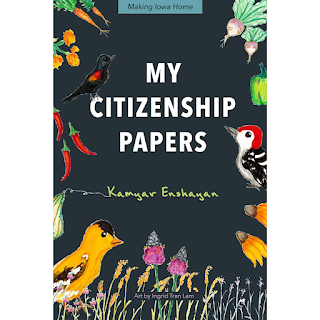Kamyar Enshayan will be the featured reader at the Final Thursday Reading Series on January 27 at the Hearst Center for the Arts. The in-person open mic starts at 7 p.m. Enshayan’s featured reading starts at 7:30. The featured reading can also be streamed live on Zoom. Click HERE for a link.
Enshayan was born in Iran and came to the U.S. in 1978. He has worked to strengthen Iowa’s local food economy, directs UNI’s Center for Energy & Environmental Education, and has served on the Cedar Falls City Council. That varied experience serves as the backdrop for his latest collection of essays, My Citizenship Papers.
This interview was conducted by Jim O’Loughlin.
Jim O’Loughlin: The essays, articles and speeches in My Citizenship Papers were written over many years to address a range of immediate concerns. What made you decide to put them all together in a book?
Kamyar Enshayan: I had been thinking about how to celebrate 40 years of living in the U.S., most of it in Iowa. And I wanted to do something to honor these years, the way I have been engaged, what I have learned, people who have been influential in who I have become. So the idea of putting a variety of short pieces together was one way; I also decided to go visit the teacher who taught me English in Hattiesburg, Mississippi 40 years ago.
JO: This book was a project you did with the Youth Art Team. Can you say a little about their work and how you became involved with the organization?
KE: I have been admiring the work of the Youth Art Team for years. Through engaging the youth in the life and history of the local community in creative ways, the Youth Art Team is helping a generation appreciate and develop affection for the place they are growing up, learn who is who and what has happened here, and shape its future. That's the heart of education, and the heart of citizenship. The theme of Making Iowa Home grew out of collaboration with the Youth Art Team, and the young artists interviewed "new Iowans" in the community and learned about their life lessons. This resulted in two short books, one written and illustrated by the Youth Art Team, and the other a series of short articles by me, illustrated by a friend, also a youth artist. 100% of proceeds from the sale of the books support the work of the Youth Art Team.
JO: I appreciate the care you use to find the right metaphors and narratives to communicate scientific concepts. Is that something you consciously try to do when writing for a general audience?
KE: Yes, scientists and engineers have a duty to translate what we know about how the world works in plain English, so that ordinary citizens can weigh in and expect that public officials make decisions based on evidence for the public interest. A strong democracy depends on making decisions in the public interest that are based on evidence rather than purchased political friendship.
JO: While there are many reasons to be concerned about the state of the environment in Iowa and beyond. I’ve always been impressed by your optimistic approach. What gives you the most hope for tackling the challenges we have?
KE: The work of people before us inspires me: people whose sacrifices have brought us our civil rights, our right to vote, laws protecting air and water. My students and my co-workers inspire me; they want to see action, they want to see knowledge acted on, effective and equitable policies implemented. That energizes my work. They say that we already know most of what we need to know to act to solve major problems. I totally agree. Let's get busy.




